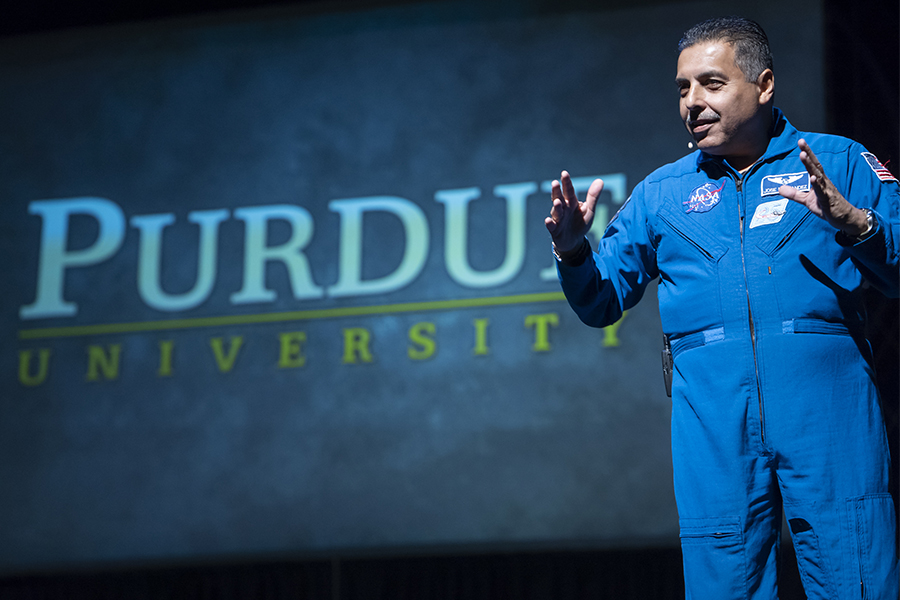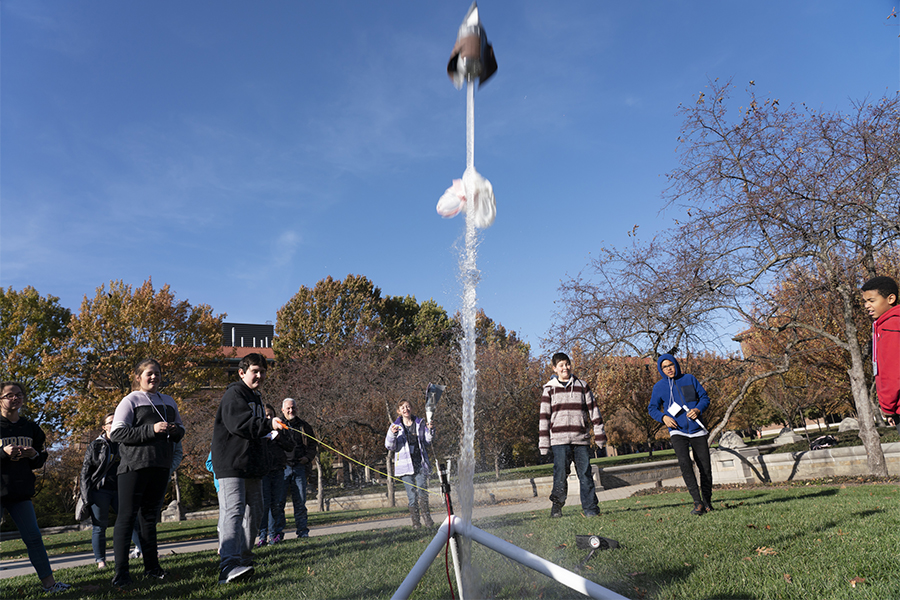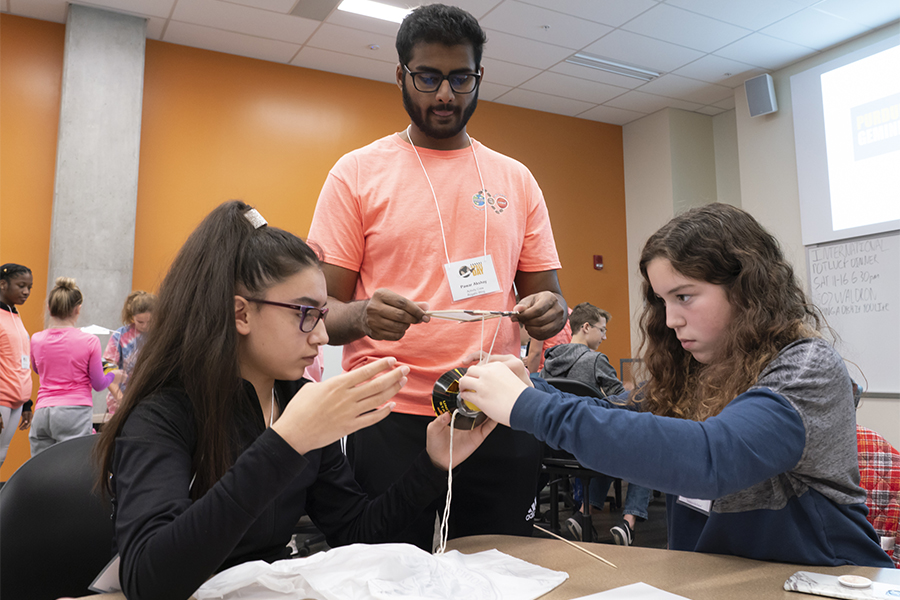Perseverance prevails at annual Purdue Space Day

Jose Hernandez was rejected when he first applied to NASA to become an astronaut.
The second application was denied, too.
And the third.
And the fourth.
And the fifth.
After the sixth rejection, he was ready to give up, to accept the dream that first materialized when he was a 10-year-old watching Purdue alumnus Eugene Cernan walk on the Moon wasn’t meant to be. But his wife, Adelita, didn’t allow it. She reminded him the rejection letter told applicants to apply again in the next class, told him she knew him well enough to know if he didn’t keep trying he’d always wonder “what if?” She told him, simply, “don’t quit.”
So Jose Hernandez didn’t. And became even more focused, targeting skills to bolster his resume. He studied the abilities of the astronauts who were selected. What he wasn’t proficient in that they were, he added. He earned his pilot’s license. He learned some Russian. He became a certified SCUBA diver.
And he kept on applying.
Finally, on Attempt No. 12, Hernandez was selected to NASA’s astronaut class in 2004.
Hernandez relayed that story of perseverance to 855 children during the first hour of Purdue Space Day on Nov. 9. The purpose was to engrain a life lesson, offer a big-picture outlook.
But some of the children who heard it — kids ranging from third to eighth grade who participated in Purdue Space Day — applied it much more quickly. Within hours of filing out of Elliott Hall of Music, where they heard Hernandez speak.

Purdue Space Day (PSD) is a one-day event intended to inspire curiosity, innovation and action through age-appropriate, space-related STEM activities. In 2019, the theme was “Footsteps to the Future” and included nine activities.
And the kids were determined to execute each of those tasks well. Even if the first attempt didn’t work how they’d hoped. Time and again throughout the day, Purdue’s army of student volunteers — more than 400 signed up — were presented with examples of children showcasing persistence.
Kenny Pritchard, the Director of Activities for PSD, was impressed by the kids’ resolve during an activity created and run by an EPICS team that required seventh and eighth graders to use simple coding and math to rotate and advance their “Mars rover” toward an objective. After being given time to plan the best route, they entered the code and observed the result. As their rovers would run into obstacles, the kids would rewrite their routes and try again, not being satisfied with their first effort. Or even their second. Again and again, they adjusted and tweaked, until they reached the destination.
Other children built simple rockets with construction paper to learn how rockets are propelled — and then launched the “stomp rockets” to see how they’d fly. If they did not sail as far as they could have upon “launch” — maybe the design wasn’t ideal for distance — kids simply picked up Attempt No. 1 and built it again, intent on making it better.
“It was encouraging to see how excited they were about learning and applying the concepts they were being taught in each activity,” said AAE student Madeline Lonis, the Director of Groups for PSD. “They worked in teams bouncing ideas off of one another and never gave up when their first attempt did not succeed. Children would even take their rockets home to further improve the designs they made through the day.”
That dogged approach will serve the kids well as, potentially, future engineers.
Just like it did Hernandez.

Hernandez realizes the importance of including perseverance as the “sixth ingredient” in the recipe for success during his talks, building on five others given to him by his father on that fateful night in 1972 when Jose first articulated his goal of becoming an astronaut. So convinced the approach works, Hernandez won’t soon stop sharing the message.
Even if it takes him to Illinois, Texas, Indiana and Florida in a one-week span, like it did recently.
“It matters to me because I look at how me watching an astronaut walk on the Moon on TV sort of changed the whole trajectory of my life and I’m saying, well, maybe I can do one better and be present in front of them and they can see an astronaut,” Hernandez said of why he is so focused on STEM outreach. “Maybe that can have an impact on them. It’s basically a way to empower them to believe that they can do it. And share that recipe my dad gave me, which I thought was brilliant.”
Hernandez hadn’t spoken at PSD until 2019. But he had heard of the event long before being invited: His son Julio is a Ph.D. student in the School of Aeronautics and Astronautics at Purdue, renowned for producing 25 astronauts.
“I realize Purdue is very proud of their own home-grown astronauts. To invite me, I consider it a great honor,” said Jose Hernandez, who flew to space on Space Shuttle Discovery to the International Space Station on the STS-128 mission in 2009. “I’m so happy to do it and glad to do it and especially since my son was in the audience watching. He’s seen a lot of my talks already. He can give my talks, if he wanted to, but the fact he took time off his busy schedule and came to see me is pretty special.”
“Special” could describe the day for the kids who attended, too. Especially considering the change in registration in 2019. PSD used a lottery for the first time, and though it increased the participant pool — 930 kids were registered — not every child who wanted to attend was able. Those who did definitely savored the opportunity.
They celebrated when water rockets were launched; they stared, open-mouthed, when their “satellites” were sent by a balloon, on a fishing line, to the second floor of the Neil Armstrong Hall of Engineering atrium; they were quick to shoot their hands in the air to ask questions of Hernandez; they were captivated by Spacekids Global founder Sharon Hagle’s traveling and training exploits to prepare as a ticketed customer on an upcoming suborbital flight with Virgin Galactic.
“The event was a success overall,” said Pritchard, an AAE student in his third year with PSD. “The kids all seemed to enjoy themselves, which is the most important part. Every year, we see things we can change and receive feedback about areas that can be streamlined. It’s a constant process of adapting and improving to make the day as fun and educational as possible for the kids.”
